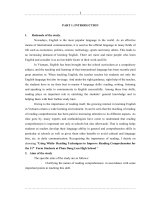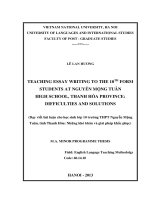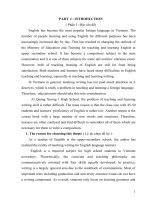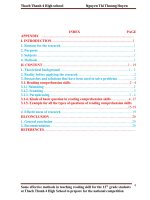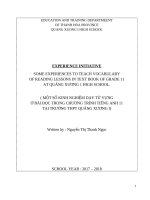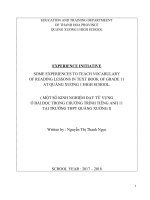APPLYING MIND – MAP TECHNIQUES TO TEACH READING COMPREHENSION TO THE TWELVETH GRADE STUDENTS AT QUANG XUONG i HIGH SCHOOL
Bạn đang xem bản rút gọn của tài liệu. Xem và tải ngay bản đầy đủ của tài liệu tại đây (996.23 KB, 18 trang )
THANH HOA EDUCATION AND TRAINING DEPARTMENT
QUANG XUONG 1 HIGH SCHOOL
EXPERIENCE INITIATIVE
APPLYING MIND – MAP TECHNIQUES TO TEACH READING
COMPREHENSION TO THE TWELVETH GRADE
STUDENTS AT QUANG XUONG I HIGH SCHOOL
( ÁP DỤNG PHƯƠNG PHÁP BẢN ĐỒ TƯ DUY DẠY ĐỌC HIỂU
TIẾNG ANH CHO HỌC SINH LỚP 12 TRƯỜNG THPT QUẢNG
XƯƠNG 1)
Writer: Nguyễn Thị Thanh Ngọc
Position: teacher
School: Quang Xuong 1 High School
Subject: English
THANH HOA, YEAR 2017
TABLE OF CONTENTS
Content
Page
1.Introduction ……………………………………………………………. 1
1.1.Rationale of the study…………………………………………………..1
1.2. Aim of the study ……………………………………………………….1
1.3. Scope of the study………………………………………………............2
1.4. The significant of the study ………………………………………….. ..2
1.5.Methodolody…………………………………………………………... ..2
2.Content…………………………………………………………………….3
2.1. Theorical background and literature view ……………………………3
2.1.1. Definition of reading …………………………………………………3
2. 1.2. Definition of reading comprehension …………………………….. ..3
2.3. Mind – map ……………………………………………………………..4
2.3.1. Definition of mind map ………………………………………………4
2.3.2. Benifits of mind maps in reading comprehension………………….....4
2.2. The reality of teaching and learning reading skill before
applying mind – map ……………………………………………………... 5
2.3. Using mind – map technique to deal with reading skill‘s problem…. 5
2.4. Effectiveness of mind – map technique, to my teaching , my
colleagues and my students in teaching and learning reading skill………12
3.Conclusion ………………………………………………………………..14
3.1.Conclusion ………………………………………………………………14
3.2. Suggestions ……………………………………………………………..14
Reference
CHAPTER I : INTRODUCTION
English as an international language has been used for all over the world in
Recent years. English plays an important role in people’s communication an English is
an compulsory subject in national exams.
This part introduces the rationale of the study, the aim, the scope, the
methodology, the time , and the design of the study.
1.1.Rationale of the study
At present reading is a compulsory skill in all schools and vocational training in
Viet Nam. The English language curriculum is based on the four language skills:
reading, speaking, listening and writing which are the cores of the curriculum.
Learners use these skills to obtain information and present information , to
communicate with people. Becoming an effective and good reader in another language,
a reader can consolidate their already- learning knowledge. The reading process in
learning a foreign language may help students review as well as increase their
knowledge of the target language through exposure to new vocabulary and grammar
structure in the text. Therefore reading skill is still one of the most important aspects
to be taught at high school.
However, students have some difficulties in learning reading skill. They find it
difficult to understand the meaning of context because they lack of background
knowledge , vocabulary. And they gradually find it bored to learn reading skill.
To help students learn reading skill effectively, I use mind map technique in
teaching skill with the hope that students will improve their vocabulary, background
knowledge, pronunciation and increase their interest in learning reading skill.
1.2. Aim of the study
- The aim of the study is to examine if using mind- map help to increase students’
interest in reading comprehension skill. It aims at:
- I identify students’ perception about mind- map and using mind – map in reading
comprehension.
1.3. Scope of the study
I carried out the investigation at Quang Xuong 1 high school to study the result of
mind – map in reading activities to improve the students’ interest , ability and help
them to read better.
1.4. The significant of the study
The study attempts to examine whether mind – map will improve students’ ability
in reading comprehension . Reading will be the most important aspect in acquiring the
target language. Therefore, the result of the study of using mind – map in reading
comprehension will make students more interested in reading comprehension and
help teachers improve their teaching method and increase students’ performance
effectively in reading comprehension.
Sum up , this study is significant because it helps to improve the classroom’s
atmostphere in reading lesson.
1.5.Methodolody
To fulfill this study, a mixed use of both quantitative and qualitative methods are
applied. The data are collected by means of questionnaire and tests.
CHAPTER II : CONTENT
2.1. Theorical background and literature view
2.1. Definition of reading
Reading has a multi - faced impact on our life. People have demand for
reading to expand their knowledge. Through reading textbooks, magazines,
newspapers,…. People can discover what happens around the world. Today, when
people have to update new mass information all over the world, reading becomes
more and more important. However, there are different point of view on the
definition of reading.
According to Siberstein ( 1993) [1] : “ Reading is complex information
processing skill in which reader interact with the text to create the meaningful
discourse.
In general term, reading is defined as “ reading is an active, fluent process
which involves the reader and reading materials in building meaning. Meaning
does not reside on the printed pages, nor is it only in the reader”. Anderson,
(5,P.1) [2] . This definition of reading has been generally shared by other
researchers deriving from those opinions, reading is considered as a process in
which a reader looks at and understands what has been written out.
2. 1.2. Definition of reading comprehension
Understanding the massage that the authors want to covey is very important.
Therefore, reading comprehension plays an important role in teaching and learning
language reading skill. Methodologists have been provide different definitions of
reading comprehension. According to Smith ( 204, p.379) [3] comprehension as a
process by which someone links what he knows about the world to what he already
has as information ( intensive) and ( expectations) in his head thus,
comprehending is the state of being out of confusion and puzzling to set things
clear with no misunderstanding”. Also concerning the reading comprehension,
Grellet ( 18, p.3) [4] argued that reading comprehension or understanding a
Written text means extracting the required information from it as efficiently as
possible”. The researcher means reading comprehension is an activity which aims
at decoding the meaning of word combination in the text in the most efficient way.
From these opinion, it can be concluded that reading comprehension is a
Process of understanding what is conveyed in the text. It does not mean that the
reader need to understand every single word in the text but activity work in the
text and extract the required information efficiently .
2.3. Mind – map
2.3.1. Definition of mind map
Mind mapping technique refers to teaching technique using mind mapping as a tool to
represent students’ understanding by using words, picture with color and symbols in a
hierarchical or tree branch format.
To explore the effective technique for teaching reading comprehension, this study
adopted mind mapping technique (1970) developed by Tony Buzan [5] as a tool to
represent the students’ understanding. Mind mapping is a graphical method of taking
note by using words, pictures with color, and symbols which take a hierarchical or tree
branch format with idea branching into their subsections. It can help poor readers to
read more effectively because the format can show the relative importance of
individual points and the way in which facts relate to one another as shown below:
Mind map is a tool for enhancing learning and thinking. It provides a structure to
reveal various aspects of a story such as the sequence of events, the key points, the
cause and effect, the relation of ideas and so on. Students can use mind maps for
revising and clarifying thoughts so as to get the deep meaning of a story
2.3.2. Benifits of mind maps in reading comprehension
- Mind maps help to increase interest in the students, thus it makes them more
receptive and co- operative in the classroom activities
-Mind maps make lesson and presentation more spontaneous, creative an enjoyable,
both for the teachers and the students. Therefore, the learning process will become
more exciting.
- Using mind maps, teacher notes become more flexible and adaptable. This created
deep remembering in students’ learning.
- Because mind maps present only relevant material in an clear and memorable
form, the students tend to get better marks in examinations
2.2. The reality of teaching and learning reading comprehension before applying
mind – map
As an English teacher, I have encountered several problems when teaching
reading skill to the twelveth grade students at Quang Xuong 1 high school. I found
it hard to teach reading skill because of various reasons such as students’ low level
of English, large – sized classes. So it is difficult to manage the class as well as
organize classroom activities. Moreover, the students’ lack of motivation is a
trouble to my teaching. Calderson Guerrero and Carvajal (2007) stated that “ A
person who is motivated to do something can get better outcomes”. Many of
students did not like reading texts because they did not understand them ,
because of the lack of vocabulary and background knowledge they had. They
thought that to understand the text, they needed to know the meaning of every
word. Besides, the students’ lack of reading skills prevents me from
teaching reading comprehension successfully. Lack of teaching equipment
for the lesson is seen as difficulties
To conclude, There are number of factors, both objective and subjective
preventing me from teaching reading skill effectively. These finding also
reflect the common problems of teaching at other school as well.
2.3. Using mind – map technique to deal with reading skill‘s problem
Here’s a list of the main components of a reading comprehension mind map. Each
one of these components lives as a node branching off from the center and will give
your student deeper insight into the literary themes, characters, and more. To help
students get started with a mind map, teacher can provide them with a template
like this one:
2.3.1. General information
Students use this section to collect information about the author, when he/she lived,
what his/her background was and how all of this might influence the book.
Connections between the author’s life and parts of the book can be visualized with
arrows. The setting of the story should be captured as well. Depending on the book,
it may make sense to provide an overview of all chapters and give the setting for
each individual chapter.
2.3.2.Characters
Comprehending fictional texts is largely about understanding the characters; what
they are driven by, what they care about, and how they’re connected to one another.
Using a mind map, students can visualize the relationships between individual
characters, both on the surface (e.g. Mercedes is Hal’s sister) and on a literary level
(e.g. Buck is the protagonist, Spitz is the antagonist).
2.3.3.Content
You can help your students understand content of a reading text by providing them
with a content framework in the mind map template which they can “fill out”
themselves
2.3.4. Vocabulary
A major obstacle in reading comprehension is new vocabulary. To ensure that your
students understand and retain all the new words (instead of just skipping over
them), tell them to add the terms they don’t understand to their mind map, either in
a separate vocabulary branch, or as part of the topic, theme, chapter and character
branches the words are related to
2.3.5.Themes, motives and symbols
For a more advanced literary analysis, create a branch for themes, motives and
symbols, and add definitions of each to remind your students what each term
means.
2.4. Effectiveness of mind – map technique to my teaching , my colleagues and
my students in teaching and learning reading skill.
2.4.1.The author’s opinion
- A mind map can help my students structure their thoughts. No matter how
complex an idea or big a topic, a mind map brings order into the chaos.
- Mind mapping provides a clear overview of a topic. It enables my students to see
the bigger picture, find connections and detect hierarchies between individual
pieces of information.
- Mind mapping enhances memory by utilizing a number of mental triggers such as
colors, images and a two-dimensional structure. Because mind maps encourage the
use of single keywords instead of whole sentences, my students are able to review
core concepts and ideas at a glance.
2.4.2. The Students’ Opinion
Almost all the students enjoy the learning process. From the open-ended
questionnaire, they explicitly wrote, “very interesting for me, I enjoy on study,” “it
is fun, colorful, and it is not make us boring,” “I feel enjoy, cool, not make me
bored, I like this method,” “I feel understand, I think it is good for me, I like this,”
“we can practice our creativity.” Moreover, one of them felt that the time was not
enough. She wrote, “it is fun but a time so short and not boring, not bad.” And one
student wrote, “it needs preparation, some of us are lazy.” The students’ reactions
to the mind mapping to comprehend the texts were categorized as good. They
stated that it was new for the most of them. Students acknowledged that they have
been used to mind mapping .They were curious about the text. They wanted to
draw of what they had read. They did not consider it as an evaluation of reading
comprehension.
2.4.3. The colleagues’ Opinion :
The teachers wrote that the students paid more attention to the teachers’
Explanation than usually. They were more focused and at the same time they were
curious about the mind mapping project. The teacher noticed that the students did
not chat with their mates or played their mobile. They asked questions to get more
clear explanation. The teacher believed that the teaching and learning process was
more conductive than usual.
CHAPTER III : CONCLUSION
3.1. Conclusion
There have been many techniques proposed to help students comprehend a text.
However, a conventional way appears to be popular among the teachers and the
students. The students have to understand each word of the text and answer several
questions based on the text. This situation affects students’ perspective on learning
reading course, especially reading English. They tend to be lazy to read since there
are too many words they do not know the meanings. Based on the experimental
statement, it was concluded that, first, mind map is one of the techniques that are
fun to do. It involves colors and pictures or drawings. The students somehow do
not realize that they are drawing their comprehension of the text. Second, there is
no major problem in teaching mind map to the students. The noise that the class
made was seen to be an interactive process. Third, mind map is good to train
students’ comprehension on the facts and details. It proves that mind map is a
superior notetaking technique. And the last, the students’ reaction on mind
mapping is mainly positive.
3.2. suggestions
Based on effective of mind – map technique in teaching and learning reading skill,
several suggestions in order to make improvement for the next study
are proposed. First, mind map technique can be used to improve students’ reading
comprehension combine with other strategies beside KWL. Second, mind map
technique can be used not only on reading narrative text but also other genres of
the text. Third, the teacher and the students need to apply the technique
continuously with some changes in the method so it will not be monotonous. This
study is important to reveal the mind mapping technique in comprehending a text.
It is a contribution to EFL methodology where mind map is an alternative
technique to be used in teaching and learning reading comprehension.
REFERENCES
[1]. Sheiberstein, S. (1993). Techniques & Resources in Teaching Reading. Oxford:
Oxford University Press.
[2]. Anderson, T.(2003). Modes of interaction in distance education: Recent
development and research questions. In M. Moore ( Ed) handbook of distance
education, Mahwah, NJ, Erlbaum.
[3]. Smith,F ( 1978). Understanding reading : A psycholinguistic analysis of
reading and learning to read. New York: Holt, Rinehart and Winston.
[4]. Grellet,F.(1981). Developing reading skills. Cambridge University Press
[5]. Buzan, T ( 1993). The Mind Map Book – How To Use Radiant Thinking To
Maximize Your Brain’s Untapped Potential. New York: Penguin Group.
XÁC NHẬN CỦA THỦ TRƯỞNG
ĐƠN VỊ
Thanh Hóa, ngày tháng 6 năm 2017
Tôi xin cam đoan đây là SKKN của
mình viết, không sao chép nội dung của
người khác
Người viết
Nguyễn Thị Thanh Ngọc
